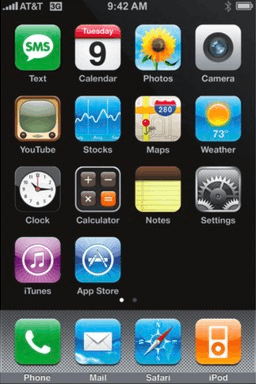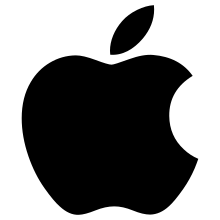iPhone OS 2
| A version of the iOS operating system | |
 | |
 iPhone OS 2 running on an iPhone 3G | |
| Developer | Apple Inc. |
|---|---|
| Source model | Closed, with open source components |
| Initial release | July 11, 2008 |
| Latest release | 2.2.1 (5H11 / 5H11a) / January 27, 2009 |
| Platforms | |
| Kernel type | Hybrid (XNU) |
| License | Proprietary EULA except for open-source components |
| Preceded by | iPhone OS 1 |
| Succeeded by | iPhone OS 3 |
| Official website | iPhone OS 2 at the Wayback Machine (archived September 12, 2008) |
| Support status | |
| Unsupported[1] | |
iPhone OS 2 is the second major release of the iOS mobile operating system developed by Apple Inc., being the successor to iPhone OS 1. It was the first release of iOS to support third-party applications via the App Store. iPhone OS 2.2.1 was the final version of iPhone OS 2. It was succeeded by iPhone OS 3 on June 17, 2009.
iPhone OS 2.0 became available on July 11, 2008 with the release of the iPhone 3G. Devices running 1.x are upgradable to this version. This version of iOS introduces the App Store, making third-party applications available to the iPhone and iPod Touch. Prior to the public release of iPhone OS 2.0, Apple held a keynote event to announce the iPhone OS Software Development Kit ("SDK") to developers.
Apps
|
|
|
|
|
Dock
Features
App Store
The most notable feature of iPhone OS 2 was the App Store. Before this feature was introduced, the only way to install custom applications on the device was via jailbreaking, which is strongly discouraged and unsupported by Apple. There were 500 applications available for download at the launch of the App Store, though this amount has grown dramatically since then. Now, the App Store has more than 2 million apps as of 2016.[2]
The Mail app had a makeover, having push-emails that provide an always-on capability. It also supports Microsoft Office attachments, as well as iWork attachments. Other new features including support for BCC, multiple email delete, and the ability to select an outgoing email.
Contacts
The Contacts app now has a new home screen icon that is only available on iPod Touch. Along with the release is the ability to search contacts without being searched one-by-one, as well as SIM contacts import ability.
Maps
New features were added to the Maps app in the iPhone OS 2.2 software update. Among the features added are the inclusion of Google Street View, directions to public transit and while walking, and the ability to display address from where the pin you dropped.
Calculator
When the device is in landscape mode, the calculator app displays a scientific calculator. Also, the app icon is updated.
Settings
Settings now had an ability to turn Wifi back on while in Airplane mode, as well as the ability to turn on/off the Location Services within the app.
Reception
Rene Ritchie at iMore said, "Overall, iPhone Firmware 2.0 is a stunning achievement that really puts the iPhone on par with the Apple II and Mac as one of the great revolutions in modern technology. It takes it beyond simple Phone + iPod, or even smartphone, and makes it the leading contender for the next great shift in computing." However, they criticized it for having stability issues and overall sluggishness.[3] Macworld said, "The iPhone 2.0 software is full of the kind of refinements that you’d expect from a second-generation Apple product. The iPhone OS still isn’t perfect, and we wish Apple has addressed some lingering shortcomings, but it’s a welcome step-up for what was already arguably the best mobile platform on the market."[4]
iPod Touch price
iPhone OS 2 cost $9.95 for iPod Touch users; it was free for iPhone users.
Version history: iPhone and iPod Touch
Supported devices
References
- ↑ Patel, Nilay (June 30, 2010). "iPhone OS 2 apps no longer welcome on the App Store". Engadget.
- ↑ Golson, Jordan (Jun 13, 2016). "Apple's App Store now has over 2 million apps". The Verge.
- ↑ Ritchie, Rene (Jul 14, 2008). "iPhone OS 2.0 review". iMore.
- ↑ Moren, Dan (Jul 15, 2008). "Review: iPhone 2.0 software update". Macworld.
External links
- iPhone OS 2 at the Wayback Machine (archived September 12, 2008)
